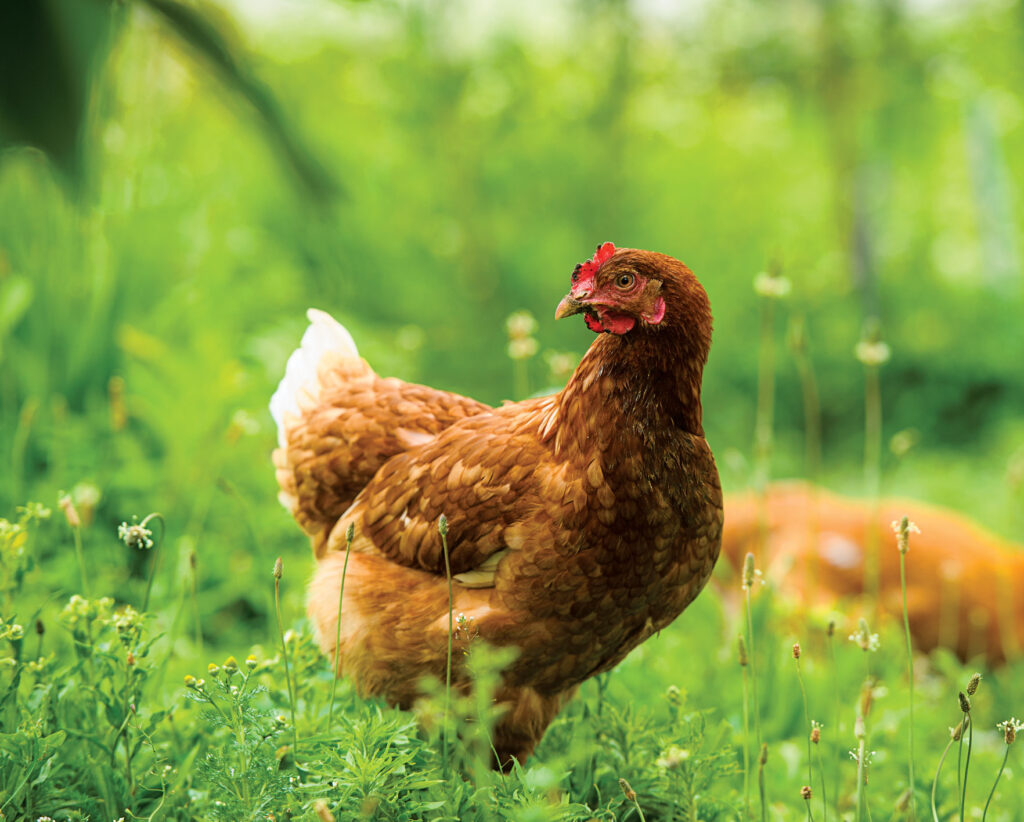Advertisement
Backyard Chickens
Rule your own roost

Tired of wondering where your eggs come from? Many Canadians are making the move toward backyard chickens. A small flock offers fresh eggs and feathery companionship, all from a standard-sized urban land plot. With a little research and dedication, these fabulous fowl can enhance your diet and get you outside.
Advertisement
Part of a sustainable system
“Even if it’s a small piece to the solution for food security, backyard chickens allow people to get back in touch with what sustains them,” says Duncan Martin, owner and founder of dailyeggs.com in Vancouver, which sells handmade chicken coops. “Chickens are a great way to contribute to a zero-food waste cycle.”
By giving the chickens some of your food scraps, you cut down on the amount that you throw away—and in return, they give you natural garden fertilizer and deliciously fresh eggs. Trendiness aside, backyard chickens give you total control over a valuable food source.
“We haven’t bought a single egg since we got them,” says Alice Bailey, a young urban homesteader living in Melbourne, Australia. Her household hen lineup includes Yolko Ono, Hennifer Aniston, and Queen Lay-tifa. “Fresh eggs really do taste better—and knowing how our chickens were cared for only adds to the appeal.”
Many people enjoy the company of chickens and find they bring an element of rural tranquility to a busy urban setting. Backyard chickens make an especially rewarding project for young families.
“It’s a great way to introduce kids to the food we eat, how we get it, and how we should treat animals,” says Martin. “We grow up learning how to care for a pet, but how we interact with farm animals is a little different.”
Advertisement
Choosing your chickens
Many different breeds have favourable temperaments. Check what’s available in your area and suited to your climate, but don’t be afraid to mix it up.
“I prefer to keep a variety of breeds,” says Martin. “They lay differently sized and coloured eggs, and we can easily monitor which chickens are laying what. Diversity makes for an interesting flock.”
Another option is to look into rescuing retired factory-farm hens and giving a second chance to an older chicken in need. These golden girls may not be in their egg-laying prime, but many still produce a few eggs a week.
For Bailey, adopting their chickens was extremely rewarding. “The best part of owning them is watching them change from sickly souls from the chicken farm to fat, healthy hens,” she says.
Tip!
To find a rescue chicken, contact your local animal shelter.
Advertisement
The scoop on the coop
Size is the most important consideration when choosing a chicken coop, which generally consists of a sheltered hutch with an attached enclosure for roaming. Each chicken needs at least 2 sq ft (0.2 sq m) of space in the hutch and 10 sq ft (1 sq m) in the outside run to avoid crowding. The enclosure must be kept safe from rodents and predators, so the chickens can head out on their own first thing in the morning.
“People make all kinds of different coops. I’ve seen people transform old Volkswagens and tree houses into a living space,” says Martin. “It’s about making sure they have a dry, protected area—not what it looks like on the outside.”
Having a coop that’s easy to clean will make your job a lot easier. Bailey and her roommates nested their chickens in an old, roomy shed and found it worked perfectly.
For more information
Duncan Martin recommends investing in a guidebook, to avoid confusing yourself with conflicting information. Examples include
- Raising Chickens For Dummies, 2nd Edition (Wiley, 2015)
- My Pet Chicken Handbook: Sensible Advice and Savvy Answers for Raising Backyard Chickens (Rodale Books 2014)
- City Chicks (Good Earth Publications, 2010)
Advertisement
Feeding the flock
Dietary needs for an adult chicken are not so different from our own: a healthy balance of carbohydrates, protein, and fat, with a range of vitamins and minerals. However, your hens will benefit from eating insoluble grit a few days a month, and possibly an extra source of calcium. Your local feed store should be able to provide you with organic feed. Adding in nontoxic garden weeds and some table scraps is fine.
“We feed our flock chicken feed, but we let them in on the leftovers of our diet,” says Martin. “Well, mostly—we leave out the coffee grounds, as a little bit of caffeine can have a big effect on chickens.”
Foods that aren’t for the birds
In addition to caffeine, foods that should stay out of your coop include
- avocado pits and skins
- citrus
- salty foods
- dried or undercooked beans
- sugar, chocolate, and candy
- liquor
- any moldy or rotten foods
- nightshades
- apple seeds
Anecdotal evidence supports other human health hacks as being good for our feathery friends. Mixing apple cider vinegar into their water offers probiotics for smooth digestion, while snacking on garlic can help keep mites away.
Advertisement
Health care
Chickens usually don’t require much upkeep to remain in good health, beside a good diet and space to roam around. However, Martin recommends giving your chickens a spot to take a dust bath by digging a nice, dry hole in the ground. Mixing in some food-grade diatomaceous earth offers them valuable natural pest control that helps get rid of mites and ticks on their skin.
Give your birds regular checkups. Stress, disease, parasites, and malnutrition can all lead to poor egg production. Symptoms of injury or illness can include
- wheezing or laboured breathing
- discharge from eyes or nostrils
- dirty, unkempt feathers
- loss of appetite
- lack of coordination
An important consideration before acquiring chickens is what you are going to do if one falls ill. Killing your own chickens isn’t permitted in most urban areas, but a sick bird can rapidly infect the whole flock. When in doubt, check with a veterinarian.
Looking out for little ones
Chicks need a little more tender loving care than their adult counterparts. Aside from a safe, enclosed space and plenty of food and water, baby chicks need a heat lamp to keep them warm until their feathers grow in. Put in some bonding time—socialized chicks are far less likely to be skittish adults.
Considering cold weather
Provided you choose a breed suited to a cooler climate and have a properly ventilated coop, it’s unlikely that you’ll need an additional heat source for adult chickens in winter, as they keep warm by huddling together and puffing up their feathers. However, make sure to change their water regularly and keep it from freezing. If you’re living in one of Canada’s harsher winter climates, it doesn’t hurt to add extra insulation to the coop.
Check your local bylaws
Backyard chicken owners have faced red tape where bylaws prevent farm animals from residing in urban areas. These days, fewer cities are crying fowl, and backyard chickens can now be legally kept in many cities, including Vancouver, Victoria, Kelowna, Montreal, Moncton, and Whitehorse. However, even where it’s legal to keep chickens, there are often restrictions regarding age, sex, and number of birds. Read the bylaws thoroughly!





